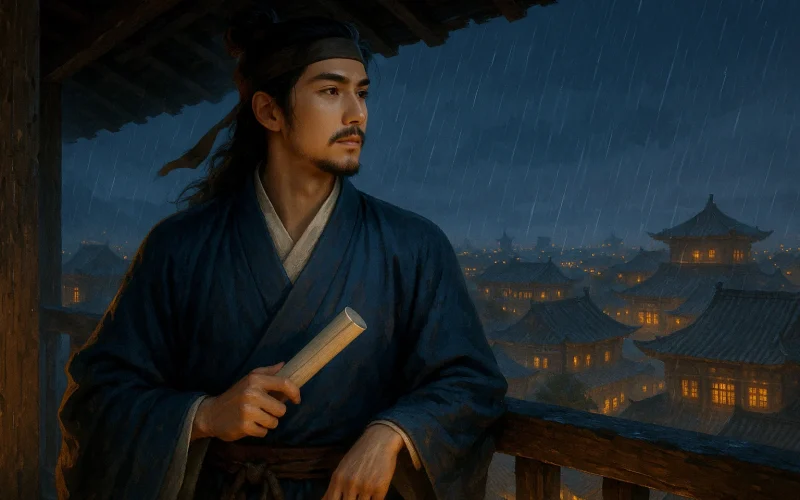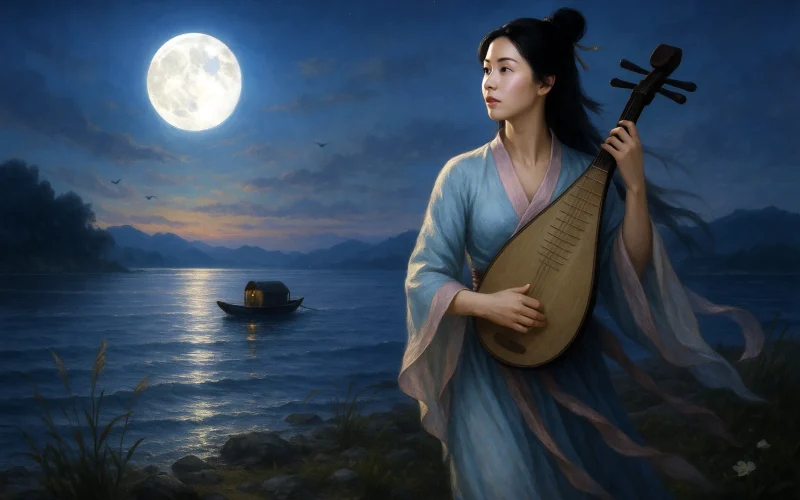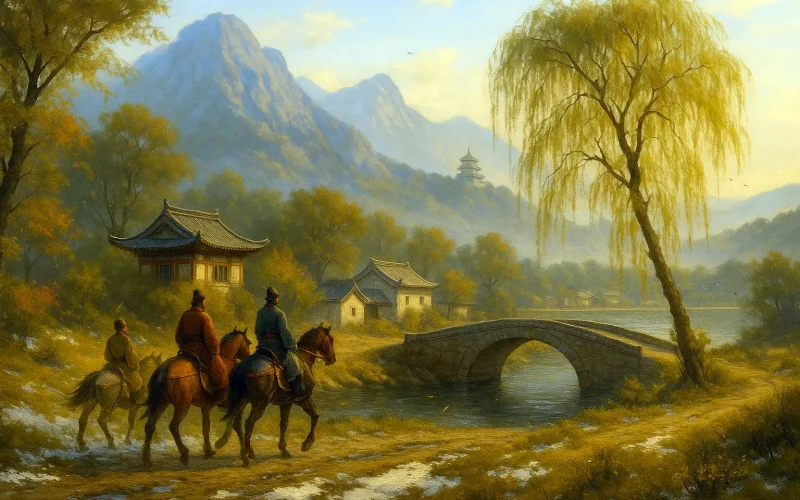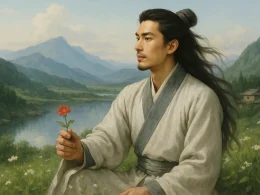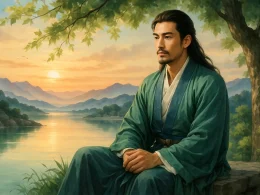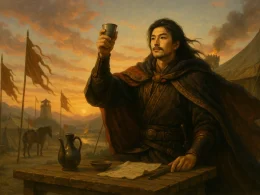Meng Jiao (孟郊) was a native of Deqing, Zhejiang Province from 751 to 814 AD. Meng Jiao wrote more than 400 poems, most of which were devoted to his personal sorrows and loneliness and expressed his cynical thoughts and feelings, while some of them exposed the social phenomenon of disparity between the rich and the poor and sympathized with the people's suffering.
Major works
Life Experiences
Early Life: A Poor Youth in Seclusion on Mount Song
Meng Jiao, styled Dongye, was born in the 10th year of the Tianbao era (751 CE) during the Tang dynasty. His hometown was Wukang Town in Deqing County, Zhejiang. His father, Meng Tingbin, was a county official with limited means, leaving the family impoverished. Meng Jiao was introverted and reserved from a young age, avoiding social interactions. In his youth, he lived as a recluse on Mount Song in Henan, dedicating himself to scholarly pursuits. However, the details of this reclusive period remain largely unknown.
Middle Age: Persistent Struggles in the Pursuit of an Official Career
Meng Jiao's attempts to join the bureaucracy were fraught with difficulties. Beginning in the first year of the Jianzhong era under Emperor Dezong (780 CE), he took the imperial examination multiple times but consistently failed. Wandering between Jiangnan and the Central Plains, he led a life of uncertainty. Despite his setbacks, he mingled with notable literati such as Lu Yu and Wei Yingwu, gaining recognition for his poetry.
In the 12th year of the Zhenyuan era (796 CE), at his mother's urging, Meng Jiao attempted the examination once more and finally passed, becoming a presented scholar (jinshi) at the age of 46. Upon returning home, his first priority was to share the good news with his mother, a deeply emotional moment that later inspired his famous poem "A Traveller's Song".
Later Years: A Blend of Poverty and Sorrow
In the 17th year of the Zhenyuan era (801 CE), Meng Jiao took up a minor official post in Liyang at his mother's insistence. However, his unyielding personality clashed with the bureaucratic environment. Preferring poetry and excursions to administrative duties, he often neglected his work. Eventually, his responsibilities were reassigned to others, and he lived in extreme poverty. By the 20th year of the Zhenyuan era (804 CE), Meng Jiao resigned and returned to Luoyang.
In the first year of the Yuanhe era under Emperor Xianzong (806 CE), he became an assistant transportation officer in Henan and briefly held the position of lyricist in the Imperial Music Bureau. While his circumstances improved slightly, he soon suffered the devastating loss of his son, which deepened his melancholy. In the 9th year of the Yuanhe era (814 CE), Meng Jiao was appointed as a military adviser to Xingyuan. However, he fell ill and died en route to his new post at the age of 64.
Literary Achievements
1. Groundbreaking Themes and Innovations
Meng Jiao’s poetry broke the narrow thematic constraints of the Dali and Zhenyuan periods. While he explored personal anguish, his work also delved into broader social realities.
- Exposing Social Injustice: Through his poems, he criticized societal flaws, highlighting the stark contrast between wealth and poverty. For example, in "Cold Weather Peasants' Lament", he juxtaposes the lavish indulgence of the wealthy—"In high halls, bells ring for feasts that last till dawn"—with the destitution of the poor—"Frost blasts through their four bare walls; their pain is inescapable". In "The Weaver's Complaint," he laments the inequities faced by laborers who toil endlessly only to wear rags.
- Depicting Familial Love: Meng Jiao poignantly expressed deep emotions, portraying maternal, spousal, and paternal affection with unmatched sensitivity. His iconic "A Traveller's Song" immortalized the profound love of a mother, while "Love Entwined" and "Mourning the Death of My Son" vividly captured spousal devotion and parental grief, respectively.
- Championing the Plight of the Marginalized: He often adopted the perspective of commoners, vividly portraying their suffering and struggles. His poems embody a strong sense of realism, continuing the tradition of Du Fu’s compassionate focus on social issues.
2. Advocacy for Ethical Revival and Independence of Thought
Drawing on Yuan Jie’s revivalist philosophy, Meng Jiao emphasized virtues like righteousness and integrity in his works. He celebrated the simplicity and authenticity of ancient traditions while critiquing the superficiality and decadence of contemporary culture. His poetry often aimed to "illuminate the rise and fall of dynasties" and "correct social mores," serving as a voice for the voiceless.
3. Literary Standing
Though Meng Jiao did not participate in Han Yu's Ancient Prose Movement, his distinctive poetic style solidified his place as a central figure in the "Han-Meng School." Combining the strength of the Han and Wei dynasties with the elegance of mid-Tang poetry, he pioneered a unique poetic path and established a lasting influence on the Tang literary tradition.
Poetic Characteristics
1. Plain Yet Profound
Meng Jiao eschewed conventional embellishments, instead seeking artistic freshness through unpretentious and weighty expression.
- Natural Simplicity: His works avoided ornate diction, conveying profound ideas with minimal words. For instance, in "An Evening View of Luoyang Bridge", he paints a desolate winter scene with effortless grace: "Below Tianjin Bridge, ice first forms; the streets of Luoyang are deserted. Sparse elms and willows frame the quiet pavilions; in moonlight, Mount Song’s snowy peaks are visible."
- Unique Syntax: By deviating from standard poetic structures, Meng Jiao achieved striking effects, as seen in lines like, "The thousand-fold fabric hides water’s depth; eighteen monks emerge from its edge."
2. Harsh and Complex
Renowned as a "bitter poet," Meng Jiao pursued linguistic sharpness and daring imagery.
- Blunt and Powerful Language: His preference for forceful terms like "burn," "break," and "shatter" created vivid effects. In "Cold Weather Peasants' Lament", for example, he writes, "If only the cold would become a moth and burn itself in their oil’s flame," capturing the resentment of the impoverished.
- Chilling Imagery: He employed motifs like "black grass," "ailing bones," and "angry rivers" to evoke desolation and sorrow, establishing an austere and haunting aesthetic.
3. Tender and Majestic
While Meng Jiao’s fame rests on his austere poetry, he also crafted pieces of exquisite tenderness and grandeur.
- Delicate Sentiment: Poems like "A Traveller's Song" express profound love with heartfelt simplicity, while "A Letter Sent" poignantly conveys the pain of separation: "My letter departs; with it goes my soul. I sit here, hollow and bereft."
- Majestic Imagery: When portraying nature’s grandeur, Meng Jiao’s works exude vigor and vitality. In "Roaming Mount Zhongnan", he writes, "Mountains block the heavens; the sun and moon are born from stone."
4. A Fusion of Tradition and Innovation
Meng Jiao masterfully blended the robust, unadorned qualities of Han-Wei poetry with the refinement of Tang lyricism, seamlessly transitioning between gentle sentiment and powerful imagery.
5. Core of the Han-Meng School
Though stylistically distinct, Meng Jiao and Han Yu were united by shared ideals. Meng Jiao’s preference for concise, robust five-character lines complemented Han Yu’s extravagant seven-character verses, both contributing to the rich diversity of the Han-Meng School.
Meng Jiao’s contributions to Chinese poetry were profound. His innovative themes, commitment to social justice, and mastery of poetic form made him a defining figure of the mid-Tang era. His legacy endures, inspiring generations with its authenticity and depth.






